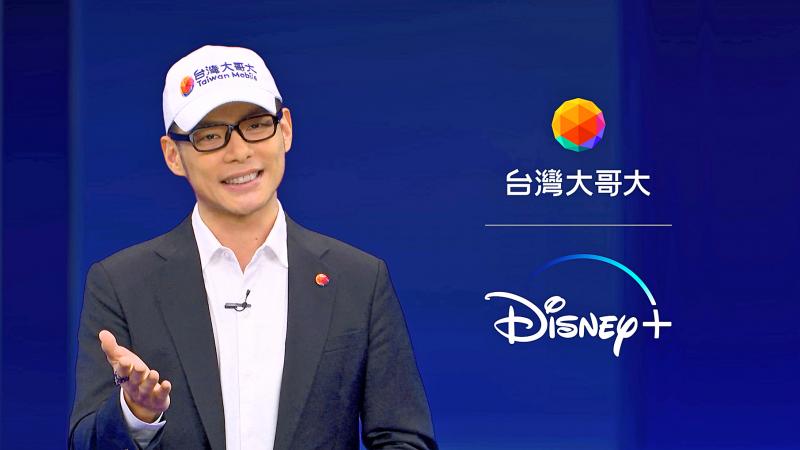Taiwan Mobile Co (台灣大哥大) yesterday said that it has clinched a deal to become the exclusive telecom to distribute Walt Disney Co’s Disney+ streaming service in Taiwan for one-and-a-half years.
Starting on Nov. 12, Taiwan Mobile’s subscribers would be able to stream more than 1,200 films and 16,000 episodes from Disney, Pixar, Marvel, Star Wars, National Geographic and Star.
“Taiwan Mobile strives to provide customers with the best application of technology and media services, so as to open the possibility for each customer and enrich their everyday lives,” Taiwan Mobile president Jamie Lin (林之晨) said.

Photo courtesy of Taiwan Mobile Co
The new over-the-top (OTT) media service is to help bolster Taiwan Mobile’s subscriber base and average revenue per user, as well as to reduce customer churn, Lin told a virtual media briefing.
Taiwan Mobile has 7.2 million mobile subscribers.
One Disney+ account allows up to seven users, four devices connected simultaneously and the ability to download content to 10 devices.
Upon launch, users can use the 5G mobile network to stream Hawkeye or utilize high-speed Wi-Fi 6 at home to watch the show through a low-latency connection to a smart TV with the 4K resolution streaming service.
Taiwan Mobile said it is exploring deeper partnerships with Walt Disney by creating content together.
Taiwan Mobile’s exclusive data plan with Disney+ is to be announced next month.
Last week, Walt Disney said that its Disney+ service would be available for NT$270 a month, or NT$2,790 a year.
Subscribers are to be able to enjoy the Disney+ experience at any time, anywhere on a wide selection of mobile and connected TV devices, it said.
Disney+ media services are to be available for Kbro Corp (凱擘) subscribers, as it and Taiwan Mobile are under the same corporate umbrella controlled by the Tsai (蔡) family, which also operates the nation’s second-biggest financial service provider, Fubon Financial Holding Co (富邦金控).
Taiwan Mobile operates cable TV and broadband businesses through its subsidiary Taiwan Fixed Network Co (台灣固網).

The US dollar was trading at NT$29.7 at 10am today on the Taipei Foreign Exchange, as the New Taiwan dollar gained NT$1.364 from the previous close last week. The NT dollar continued to rise today, after surging 3.07 percent on Friday. After opening at NT$30.91, the NT dollar gained more than NT$1 in just 15 minutes, briefly passing the NT$30 mark. Before the US Department of the Treasury's semi-annual currency report came out, expectations that the NT dollar would keep rising were already building. The NT dollar on Friday closed at NT$31.064, up by NT$0.953 — a 3.07 percent single-day gain. Today,

‘SHORT TERM’: The local currency would likely remain strong in the near term, driven by anticipated US trade pressure, capital inflows and expectations of a US Fed rate cut The US dollar is expected to fall below NT$30 in the near term, as traders anticipate increased pressure from Washington for Taiwan to allow the New Taiwan dollar to appreciate, Cathay United Bank (國泰世華銀行) chief economist Lin Chi-chao (林啟超) said. Following a sharp drop in the greenback against the NT dollar on Friday, Lin told the Central News Agency that the local currency is likely to remain strong in the short term, driven in part by market psychology surrounding anticipated US policy pressure. On Friday, the US dollar fell NT$0.953, or 3.07 percent, closing at NT$31.064 — its lowest level since Jan.

Hong Kong authorities ramped up sales of the local dollar as the greenback’s slide threatened the foreign-exchange peg. The Hong Kong Monetary Authority (HKMA) sold a record HK$60.5 billion (US$7.8 billion) of the city’s currency, according to an alert sent on its Bloomberg page yesterday in Asia, after it tested the upper end of its trading band. That added to the HK$56.1 billion of sales versus the greenback since Friday. The rapid intervention signals efforts from the city’s authorities to limit the local currency’s moves within its HK$7.75 to HK$7.85 per US dollar trading band. Heavy sales of the local dollar by

The Financial Supervisory Commission (FSC) yesterday met with some of the nation’s largest insurance companies as a skyrocketing New Taiwan dollar piles pressure on their hundreds of billions of dollars in US bond investments. The commission has asked some life insurance firms, among the biggest Asian holders of US debt, to discuss how the rapidly strengthening NT dollar has impacted their operations, people familiar with the matter said. The meeting took place as the NT dollar jumped as much as 5 percent yesterday, its biggest intraday gain in more than three decades. The local currency surged as exporters rushed to